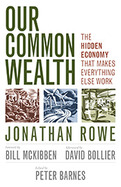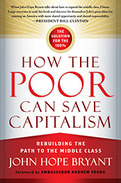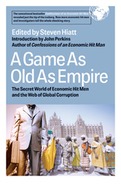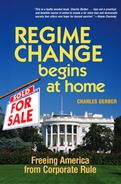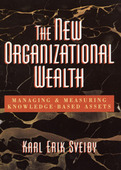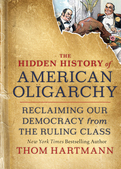2013
A huge part of our economy is invisible, invaluable, and under siege. This book describes a growing movement to recognize and defend the commons on many fronts: community initiatives, legal actions, and visionary proposals.
- Identifies an essential but overlooked and endangered sector of our economy
- Beautifully written-clear, accessible, poetic
- Filled with examples of what can be done to protect, nurture, and share our common wealth
A huge part of our economy is invisible, invaluable, and under siege. "The commons" is a term that denotes everything we share as opposed to own privately. Some parts of the commons are gifts of nature: the air and oceans, the web of species, wilderness, and watersheds. Others are the product of human creativity and endeavor: sidewalks and public squares, the Internet, our languages, cultures, technologies, and infrastructure. In graceful and down-to-earth prose, Jonathan Rowe illuminates the scale and value of the commons, its symbiotic relationship with the rest of the economy, its importance to our personal and planetary well-being, and how it is threatened by privatization and neglect.
Rowe also describes a growing movement to recognize and defend the commons on many fronts: community initiatives, legal actions, and visionary proposals such as a "sky trust" to charge polluters and distribute the proceeds to all of us. Simple gestures can be powerful too: Rowe relates how he set some benches in a vacant lot and watched a public gathering space take shape.
For decades, people have defended the commons and not known it. They've battled pollution, development, corporate marketing assaults on their kids, and many other attacks on common wealth. What's been missing is a story that unifies all these seemingly unrelated battles with the force of a powerful idea. This is what Jonathan Rowe provides in this thought-provoking book.
- Identifies an essential but overlooked and endangered sector of our economy
- Beautifully writtenclear, accessible, poetic
- Filled with examples of what can be done to protect, nurture, and share our common wealth
- Click here for the press release
A huge part of our economy is invisible, invaluable, and under siege. "The commons" is a term that denotes everything we share as opposed to own privately. Some parts of the commons are gifts of nature: the air and oceans, the web of species, wilderness, and watersheds. Others are the product of human creativity and endeavor: sidewalks and public squares, the Internet, our languages, cultures, technologies, and infrastructure. In graceful and down-to-earth prose, Jonathan Rowe illuminates the scale and value of the commons, its symbiotic relationship with the rest of the economy, its importance to our personal and planetary well-being, and how it is threatened by privatization and neglect.
Rowe also describes a growing movement to recognize and defend the commons on many fronts: community initiatives, legal actions, and visionary proposals such as a sky trust to charge polluters and distribute the proceeds to all of us. Simple gestures can be powerful too: Rowe relates how he set some benches in a vacant lot and watched a public gathering space take shape.
For decades, people have defended the commons and not known it. Theyve battled pollution, development, corporate marketing assaults on their kids, and many other attacks on common wealth. Whats been missing is a story that unifies all these seemingly unrelated battles with the force of a powerful idea. This is what Jonathan Rowe provides in this thought-provoking book.
"When John Hope Bryant talks about how to expand the middle class, I listen. I urge everyone to read this book and discover for themselves John's great ideas for creating an America with more shared opportunity and shared responsibility."
-- President Bill Clinton
Business and political leaders are ignoring the one force that could truly re-energize the stalled American economy: the poor. Instead of spending millions pursuing "emerging markets" in far-flung, corrupt, and even dangerous countries, companies can find enormous untapped potential right under their noses. If we give poor communities the right tools, policies, and inspiration, they will be able to lift themselves up into the middle class and become a new generation of customers and entrepreneurs.
John Hope Bryant knows this firsthand. Raised in poverty-stricken, gang-infested South Central Los Angeles, he became a successful businessman and founded Operation HOPE, a nonprofit that promotes "silver rights"-financial dignity and empowerment-for millions.
The poor are not stupid or lazy, Bryant writes, they've simply been abandoned. Business loans, home loans, and financial investments have vanished from their communities. After decades of deprivation they lack bank accounts, decent credit scores, and any real firsthand experience of how a healthy free enterprise system functions. The young have no role models for success other than athletes, entertainers, and, sadly, criminals.
Bryant exposes the historical roots of this unfortunate situation, explains why the solutions tried so far have proved insufficient, and offers a way forward. He lays out what he calls a Marshall Plan for our times, a series of straightforward, actionable steps to build financial literacy and expand opportunity so that the poor can join the middle class.
Fully 70 percent of the American economy is driven by consumer spending, but more and more people have too much month at the end of their money. John Hope Bryant aspires to "expand the philosophy of free enterprise to include all of God's children" and create a thriving economy that works not just for the 1 percent or even the 99 percent but for the 100 percent.
With chapters spotlighting how specific countries around the globe have been subverted, A Game As Old As Empire uncovers the inner workings of the institutions behind these economic manipulations. The contributors detail concrete examples of how the “economic hit man game” is still being played: an officer of an offshore bank hiding hundreds of millions of dollars in stolen money, IMF advisers slashing Ghana's education and health programs, a mercenary defending a European oil company in Nigeria, a consultant rewriting Iraqi oil law, and executives financing warlords to secure supplies of coltan ore in Congo. Together they show how this system of corruption and plunder operates in real life, and reveal the price that the rest of the world must pay as a result.
Most important, A Game As Old As Empire connects the dots, showing how the various pieces of this system come together to create the world's first truly global empire.
• Builds on the shocking picture of worldwide economic corruption first presented in John Perkins' Confessions of an Economic Hit Man
• Features a dozen chapters detailing contemporary examples of how the economic hit man game is played around the globe
John Perkins’ controversial and bestselling exposé, Confessions of an Economic Hit Man, revealed for the first time the secret world of economic hit men (EHMs). But Perkins’ Confessions contained only a small piece of this sinister puzzle. The full story is far bigger, deeper, and darker than Perkins’ personal account revealed. Here other EHMs, journalists, and investigators join Perkins to tell their own stories, providing the first probing and expansive look into this pervasive web of systematic corruption.
With chapters spotlighting how specific countries around the globe have been subverted, A Game As Old As Empire uncovers the inner workings of the institutions behind these economic manipulations. The contributors detail concrete examples of how the “economic hit man game” is still being played: an officer of an offshore bank hiding hundreds of millions of dollars in stolen money, IMF advisers slashing Ghana’s education and health programs, a mercenary defending a European oil company in Nigeria, a consultant rewriting Iraqi oil law, and executives financing warlords to secure supplies of coltan ore in Congo. Together they show how this system of corruption and plunder operates in real life, and reveal the price that the rest of the world must pay as a result.
Most important, A Game As Old As Empire connects the dots, showing how the various pieces of this system come together to create the world’s first truly global empire.
- By the author of the internationally acclaimed books Corporation Nation, The Wilding of America, People Before Profit, and The Pursuit of Attention
- Shows that Americans are ruled not just by a particular administration but by a corporate regime, spanning several decades and incorporating both mainstream political parties, which puts the interests of big business ahead of those of ordinary Americans
- Offers hope-and detailed strategies and tactics-for defeating the corporate regime and returning America to its people
Shares in Microsoft, the world's largest computer software firm, changed hands at an average price of $70 during 1995, at a time when their "book value" or "equity" was just $7. In other words, for every $1 of tangible value, the market saw $9 of additional value, for which there was no corresponding record in Microsoft's balance sheet. This extra $9 in the value of Microsoft shares represents a major trend. More and more, companies are deriving value from their intangible assets. These assets include their employee's creative ideas, their customers' loyalty, their ability to attract and keep prestigious accounts, their innovative products and services, their popular brand names, and their reputation.
Knowledge-based organizations with intangible assets, such as accounting and legal firms, management consultants, advertising agencies, medical clinics and hospitals, software and engineering companies, and the art and entertainment industry make up the fastest growing business sector. Yet few of these companies achieve their potential performance and profitability because they do not know how to exploit their intangible assets. They measure performance only in terms of money, ignoring less tangible but vital assets such as the ability to capture high profile customers or the creativity to keep the company on the cutting edge with innovative products or services.
The New Organizational Wealth shows how some of the fastest-growing, most profitable companies are discovering that potentially limitless revenues can flow from their firm's intangible assets-the ability of employees, customers, and even suppliers to create new concepts, models, products, and services. Among the book's many examples is Netscape Communications. This successful company demonstrates the profitable results of fostering long-term customer relationships and the effectiveness of investing in employee competence to maintain a rich pool of talent.
The New Organizational Wealth outlines the conceptual framework for changing business strategies to focus on intangible assets. Using its guidelines, managers can learn how to identify the indicators for their company's intangible assets-their employee's talents and strengths, their customers' support and interest, and their supplier's reliability and ingenuity. Specific chapters detail how to effectively use and measure these "tacit" assets, as well as how to monitor them for financial success. Helpful case studies of Scandanavian companies such as WM-data-s, Skandia AFS, and Celemi, which have developed systems for measuring intangible assets and publicly reporting the results, provide models managers can use in leading their companies to increased profitability and long-term organizational success.
- The first book on managing and measuring intangible assets
- Shows how to tap customer and employee knowledge to build a more successful organization
- Provides tools for measuring such intangible assets as competent and creative employees, patents, brand names, or company reputation
- Written by an experienced manager who played a key role in developing the "Scandinavian Movement" of management
Billionaire oligarchs want to own our republic, and they're nearly there thanks to legislation and Supreme Court decisions that they have essentially bought. They put Trump and his political allies into office and support a vast network of think tanks, publications, and social media that every day push our nation closer and closer to police-state tyranny.
The United States was born in a struggle against the oligarchs of the British aristocracy, and ever since then the history of America has been one of dynamic tension between democracy and oligarchy. And much like the shock of the 1929 crash woke America up to glaring inequality and the ongoing theft of democracy by that generation's oligarchs, the coronavirus pandemic of 2020 has laid bare how extensively oligarchs have looted our nation's economic system, gutted governmental institutions, and stolen the wealth of the former middle class.
Thom Hartmann traces the history of this struggle against oligarchy from America's founding to the United States' war with the feudal Confederacy to President Franklin Roosevelt's struggle against “economic royalists,” who wanted to block the New Deal. In each of those cases, the oligarchs lost the battle. But with increasing right-wing control of the media, unlimited campaign contributions, and a conservative takeover of the judicial system, we're at a crisis point.
Now is the time for action, before we flip into tyranny. We've beaten the oligarchs before, and we can do it again. Hartmann lays out practical measures we can take to break up media monopolies, limit the influence of money in politics, reclaim the wealth stolen over decades by the oligarchy, and build a movement that will return control of America to We the People.


